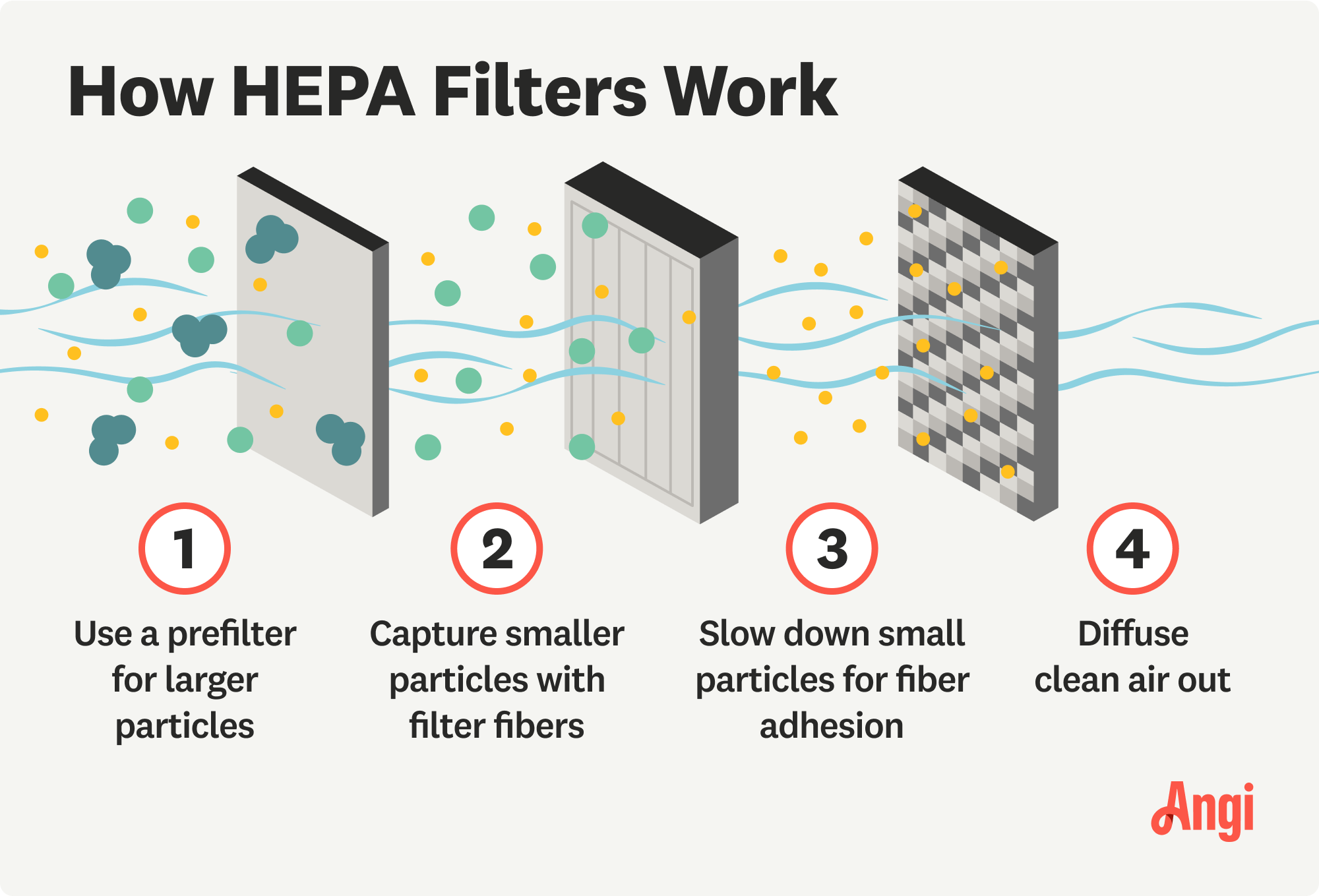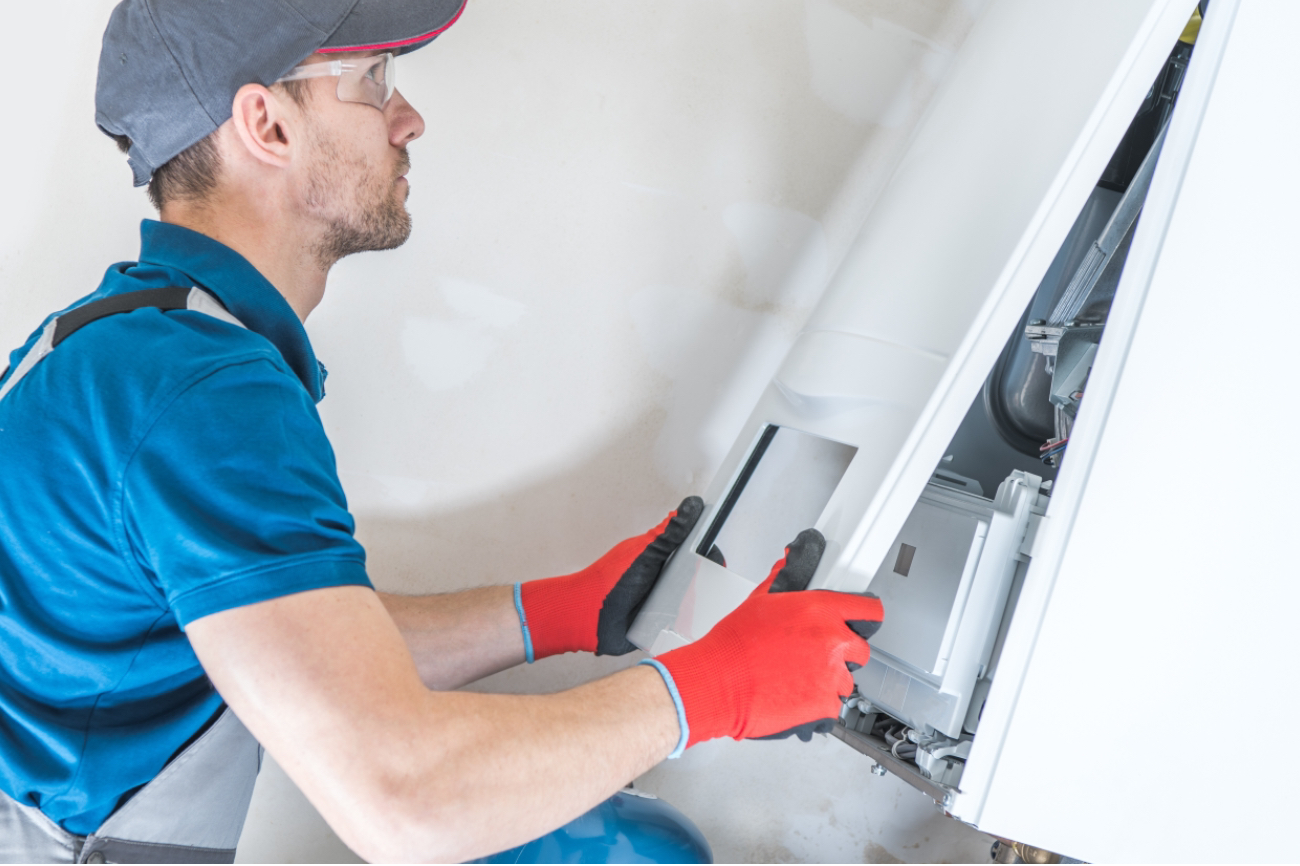
Springing for HVAC maintenance costs may seem like an extra—and easy-to-ignore—item on your checklist, but it will save you money in the long run.
Breathe easy knowing you have quality air


A HEPA filter is a high-efficiency air filter commonly found in air purifiers.
There are different types of HEPA filters, all with different filtration capabilities.
Using a HEPA filter can help improve your air quality significantly by removing airborne pathogens and allergens like pet dander.
A HEPA filter is a helpful tool for keeping the air in your home fresh. You’ve probably encountered this kind of clean air filtration without quite knowing what it is. In this unfiltered guide, you’ll learn all there is to know about HEPA filters, so you can understand if they’re the right choice for you and your home.
HEPA stands for high-efficiency particulate air and is a type of air filter that, according to the EPA, can ostensibly remove 99.97% of any airborne particles with a size of 0.3 microns—which is very tiny. This includes most things you’d find in the air in your home, like dust, pollen, mold, bacteria, and more.
The filter comprises the housing, filter material—either polypropylene or fiberglass—adhesive, protective fence, and sealing strips. While commonly found in air purifiers, HEPA filters can also be found in vacuum cleaners to help trap unwanted dust.

A HEPA filter is about as strong as you can get in terms of air filtration. The many layers of fiber work to:
Stop the larger particles through a prefilter, also known as the inertial impaction
Disperse smaller particles through the filter’s fibers
Slow the small particles down so they can adhere to the fibers
Diffuse the clean air out
This intricate system is hard to replicate and has an efficiency score of 17 to 20 on the MERV scale (short for Minimum Efficiency Reporting Value).

Not all HEPA filters are created equal. They are graded as H10 to H14 to denote their filtration percentages. These grading classifications are divided into different types, and some brands may try to deceive you with knock-off versions.
Some air filter brands on the market boast “HEPA-Like” or “HEPA-type” filters. That’s because HEPA filters meet a certain standard and are tested before they hit the store shelves. These filters try to capitalize on the name recognition of “HEPA” without actually meeting that standard.
They’ll sometimes have a HEPA rating of H10 or H11, which trap 85% and 95%, respectively. While these are still highly efficient, they aren’t at the same level as HEPA filters. Make sure to read the package carefully to make sure you’re purchasing a proper HEPA filter.
True HEPA filters meet the standard of quality and have passed the test that ensures they capture 99.97% of airborne particles at 0.3 microns. While they are certifiably HEPA filters and still very effective, they’re technically not the highest classification of HEPA filters you can buy.
Absolute HEPA filters are the highest tier of HEPA filters, claiming to filter 99.99% at 0.3 microns. These are classified at a medical-grade level and are often used for hospitals, clinics, and science labs.
The difference between HEPA and regular HVAC filters is the amount of smaller particles each can catch. Because of the way HEPA filters are structured, they can catch much smaller particles like pollen, pet dander, or smoke. Regular filters only trap the larger dust particles that fly around your home, meaning those smaller ones are still circulating.

Clean air is always better, and HEPA filters help you breathe in the highest-quality air possible. Here are some general benefits.
Breathe cleaner air: HEPA filters remove unwanted airborne pathogens, improving air quality for everyone in your household, especially children, older individuals, and the immunocompromised.
Eliminate allergens: Pet dander can get trapped or linger on furniture and carpets, only to be released once your guests arrive. A HEPA filter can help significantly reduce that dander, leaving your allergy-prone guests feeling more comfortable.
Improve furniture life span: Circulating your air using a HEPA filter can reduce the amount of dust and bacteria in the air, reducing the number of times you need to dust and clean your furniture.
The most common use cases for HEPA filters are in air purifiers or vacuum cleaners. While they are sometimes found in HVAC systems, using a HEPA filter here is not recommended because they don’t allow that much airflow, causing your HVAC to work harder to get the same air pressure as other filters.
These filters also need constant replacement, sometimes up to twice a month, and HVAC filter replacement costs $20 to $100 or more per HEPA filter. To get the most use out of them, it’s best to keep your HEPA filters in smaller appliances.
When hiring an HVAC professional, you should consider bundling your service with add-ons to save on total labor costs. According to Angi data, 42% of customers report adding central AC services, and 13% requested installing a zoning system or thermostat. Other popular add-ons include HEPA filters, heat pumps, and humidifiers.
From average costs to expert advice, get all the answers you need to get your job done.

Springing for HVAC maintenance costs may seem like an extra—and easy-to-ignore—item on your checklist, but it will save you money in the long run.

What you’ll pay in Columbus, OH, for furnace repairs depends on many factors. Here’s a breakdown of what can go wrong and the cost to fix those issues.

Here's what you can expect when getting an estimate for coolant leak repair costs. The cost can vary based on the detection method used, the source of the leak, and the amount of damage that needs to be repaired in the aftermath.

Discover heat exchanger replacement costs to learn about price factors, labor, and ways to save before hiring a pro or starting your project.

There are few things more important to homeowners than keeping their AC systems running. Use this guide on AC leak repair to keep your home cool and comfy.

Energy bills rising? Here’s how to perform a DIY duct leakage test to locate any damage in your ductwork and restore your energy-efficient home.